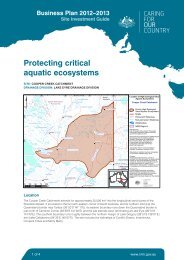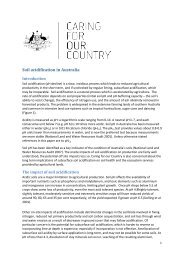Improving land management practices - Caring for our Country
Improving land management practices - Caring for our Country
Improving land management practices - Caring for our Country
Create successful ePaper yourself
Turn your PDF publications into a flip-book with our unique Google optimized e-Paper software.
Report Card 2010–2011<br />
Outcome In<strong>for</strong>mation Sheet<br />
SUSTAINABLE FARM PRACTICES—<br />
IMPROVING LAND MANAGEMENT PRACTICES<br />
Sustainable <strong>practices</strong> conserve and enhance the long-term capacity of the nation’s res<strong>our</strong>ces and contribute to maintaining a healthy<br />
environment. Australian farmers manage about 70 per cent of the Australian <strong>land</strong>scape, while Australian fishers operate in an<br />
area greater than the entire Australian <strong>land</strong>mass. Their <strong>management</strong> and operational <strong>practices</strong> have a crucial role in the future of<br />
Australia’s natural res<strong>our</strong>ces both on <strong>land</strong> and in the water.<br />
Through <strong>Caring</strong> <strong>for</strong> <strong>our</strong> <strong>Country</strong>, over 16 800 participants, including farmers in the cropping, horticulture and grazing sectors, took part in 141 projects to<br />
improve their <strong>management</strong> <strong>practices</strong> to deliver improved ecosystem services. Many projects resulted in more farmers in priority regions undertaking activities<br />
to improve their knowledge, skills and <strong>practices</strong> in managing different soil types and reducing environmental impacts.<br />
In 2010–11, two new projects were funded to improve <strong>practices</strong> and optimise sustainability <strong>for</strong> commercial fishers and aquaculture farmers.<br />
CASE STUDIES<br />
BEGA CHEESE HELPS DAIRY FARMERS SECURE A<br />
SUSTAINABLE FUTURE (NSW)<br />
Bega Cheese is Australia’s largest listed dairy company producing 200 000<br />
tonnes of dairy products at five sites. Currently 472 dairy farms across New<br />
South Wales, Victoria and South Australia supply milk to Bega Cheese.<br />
The company’s Environmental Management System (BEMS) has been<br />
operating since 2005, and has resulted in significant improvements in<br />
on-farm <strong>management</strong> <strong>practices</strong> in the Bega region of NSW.<br />
In 2010 Bega Cheese received <strong>Caring</strong> <strong>for</strong> <strong>our</strong> <strong>Country</strong> funding to deliver<br />
BEMS across its entire supplier base. The project will help farmers<br />
improve their knowledge and skills, increase the adoption of improved<br />
<strong>management</strong> <strong>practices</strong>, including ongoing <strong>land</strong>scape-scale biodiversity<br />
conservation activities.<br />
The project will benchmark and monitor current <strong>management</strong> <strong>practices</strong><br />
and identify areas requiring improvement, from the individual farm to the<br />
regional level.<br />
“It is a fantastic opportunity <strong>for</strong> Bega Cheese to help <strong>our</strong> suppliers secure<br />
their sustainable future. BEMS has been successful in the Bega region<br />
because it targets the needs of <strong>our</strong> suppliers. The <strong>Caring</strong> <strong>for</strong> <strong>our</strong> <strong>Country</strong><br />
funding helps us identify the needs of all <strong>our</strong> suppliers and deliver targeted<br />
extension programs in the future”, said Melissa Balas, Senior Environment<br />
and Sustainability Officer <strong>for</strong> Bega Cheese.<br />
The project has resulted in around 100 farmers voluntarily participating<br />
in the sustainability assessment process. Soil trials are also being<br />
implemented in all of the supplier regions to help identify soil health<br />
issues, and to assist in monitoring changes over time. Most of the farmers<br />
who have participated in the sustainability assessment process have found<br />
A herd of Jersey cows which produces milk <strong>for</strong> Bega Cheese.<br />
Photo: Department of Agriculture, Fisheries and Forestry<br />
the process has improved their knowledge and skills of best practice<br />
natural res<strong>our</strong>ce <strong>management</strong>.<br />
A series of farmer workshops targeted at improving res<strong>our</strong>ce <strong>management</strong><br />
<strong>practices</strong> are being held in each of the supplier regions. The workshops<br />
have been very well attended and well received by the participants.<br />
Bega Cheese anticipates the in<strong>for</strong>mation obtained from this project will<br />
help to focus their extension activities, monitor changes in <strong>management</strong><br />
<strong>practices</strong> and help their dairy farmers remain sustainable into the future.<br />
www.nrm.gov.au
IMPROVING WATER QUALITY IN CAGE FINFISH<br />
AQUACULTURE: MANAGING NET BIOFOULING (TAS)<br />
Tassal Operations, with the support of <strong>Caring</strong><br />
<strong>for</strong> <strong>our</strong> <strong>Country</strong> funding of $206 000, is<br />
contributing to the ongoing sustainability of the<br />
Tasmanian caged aquaculture industry. They are<br />
researching and developing new techniques <strong>for</strong><br />
cleaning and maintaining netting.<br />
Net biofouling is a constant problem <strong>for</strong> the<br />
caged aquaculture industry. If nets are not clean,<br />
the flow of water is restricted, and fish health is<br />
compromised by reduced oxygen in the water<br />
and build-up of excess food and waste.<br />
Through the funding received from <strong>Caring</strong><br />
<strong>for</strong> <strong>our</strong> <strong>Country</strong>, Tassal Operations is testing<br />
a Marine Inspection Cleaner (MIC) vacuum<br />
system, to clean the nets while in-situ. The MIC<br />
draws organisms from the salmon nets and<br />
releases the net-wash into the water column,<br />
reducing the need <strong>for</strong> anti-foulant paints and<br />
minimising the impact on the environment.<br />
Sound research methodologies were developed<br />
early on in the project, as were relationships<br />
built with research organisations such as CSIRO<br />
and local specialist laboratories so that accurate<br />
water quality tests could be undertaken and used<br />
to in<strong>for</strong>m the project. As a result of the project,<br />
Tassal Operations has been able to develop best<br />
Marine Inspection Cleaner vacuum system cleaning the nets while in-situ. Photo: Tassal Operations Pty Ltd<br />
practice guidelines in managing net biofouling,<br />
to share with the broader aquaculture industry. A<br />
number of other countries have also expressed<br />
interest in the research findings.<br />
These new techniques being tested by Tassal<br />
Operations will help protect the water quality in<br />
which the Tasmanian salmon industry operates.<br />
FOR FURTHER INFORMATION<br />
<strong>Caring</strong> <strong>for</strong> <strong>our</strong> <strong>Country</strong>, sustainable farm practice: www.nrm.gov.au/about/caring/priorities/sustainable.html<br />
<strong>Caring</strong> <strong>for</strong> <strong>our</strong> <strong>Country</strong> Outcomes 2008–2013: www.nrm.gov.au/res<strong>our</strong>ces/index.html<br />
www.nrm.gov.au
















